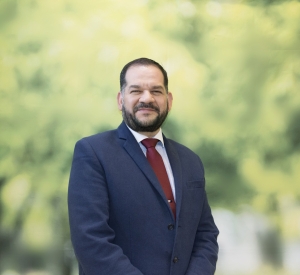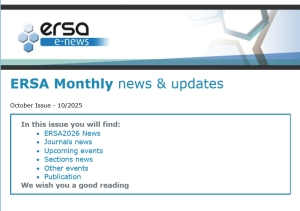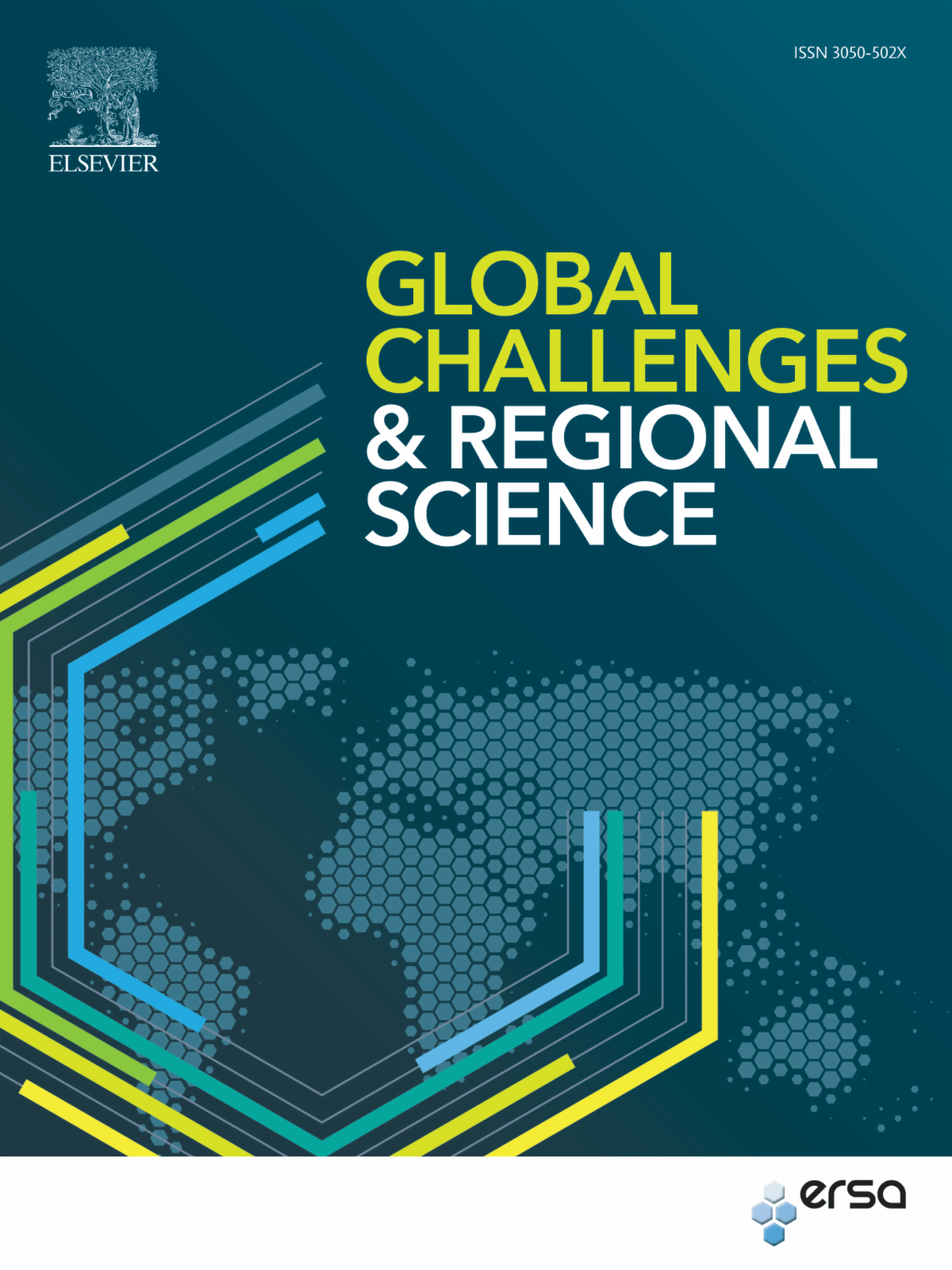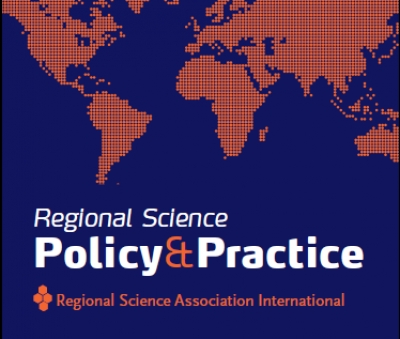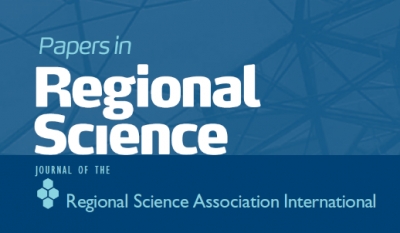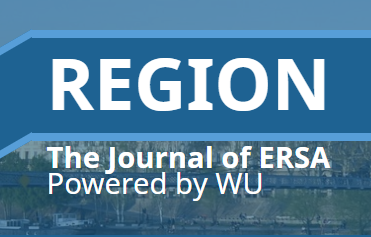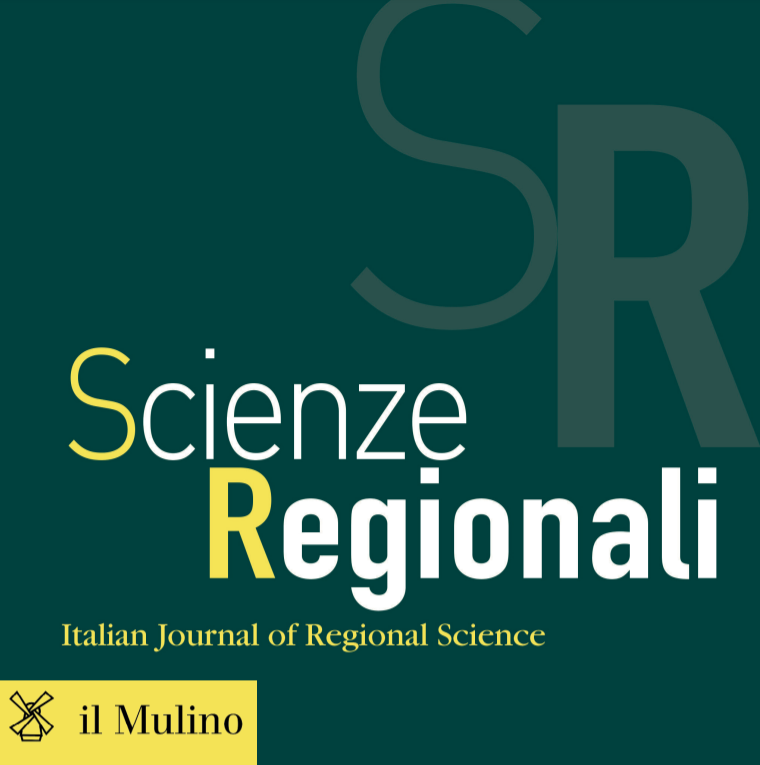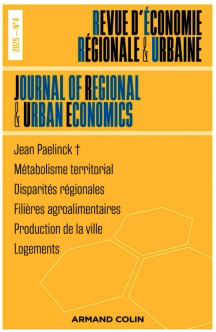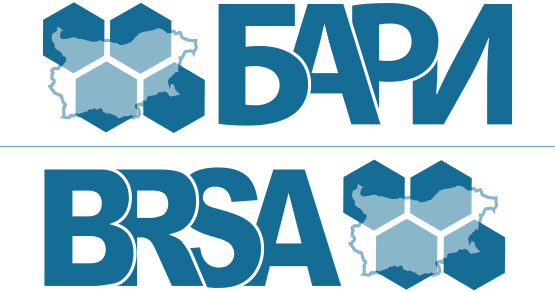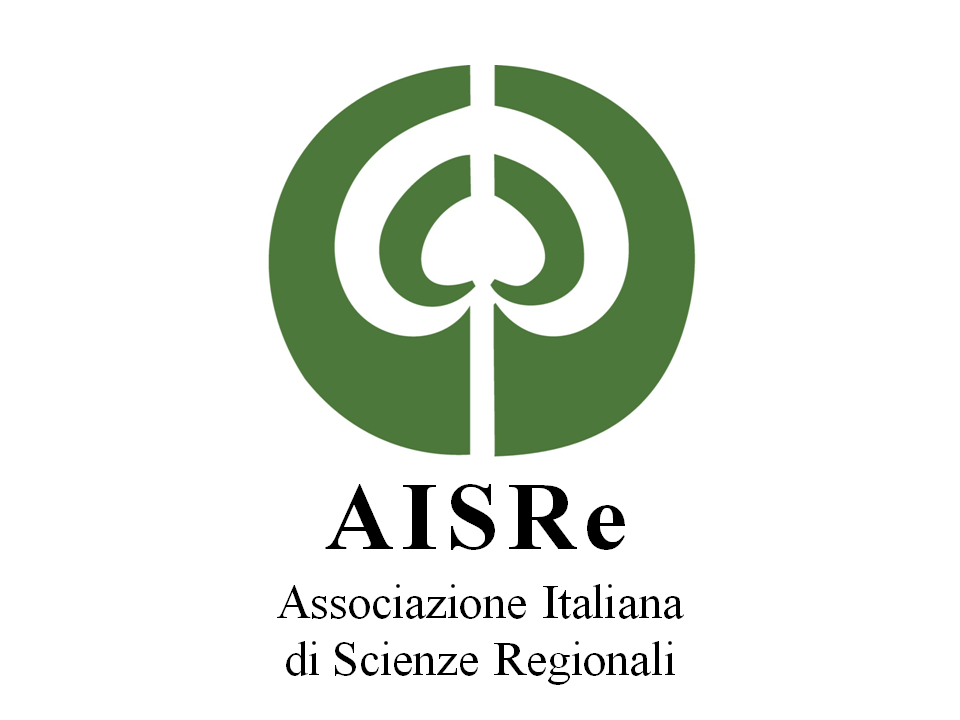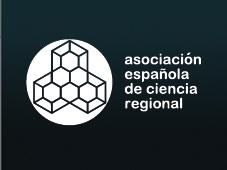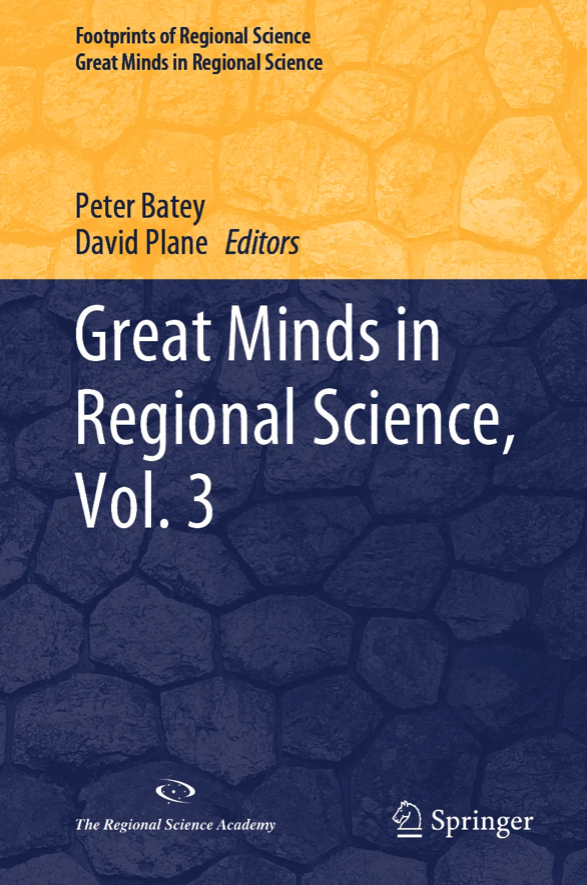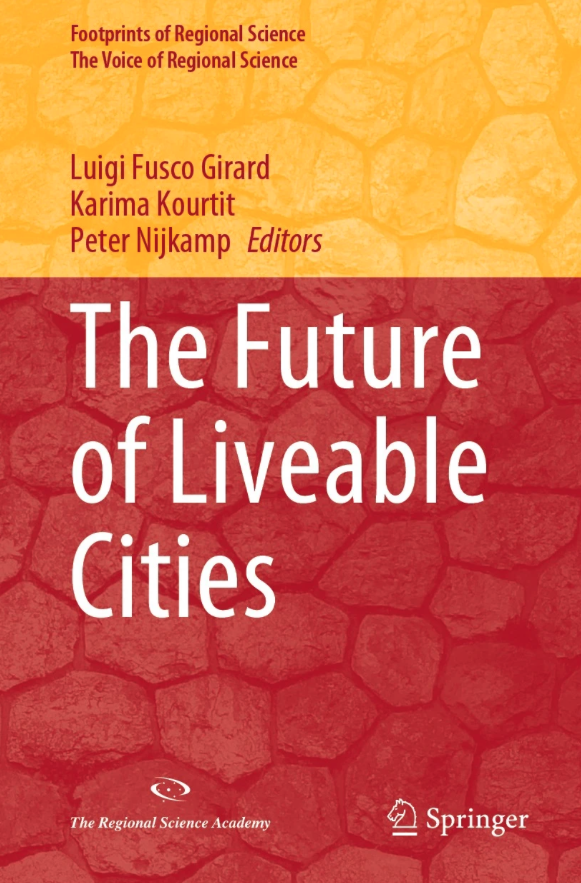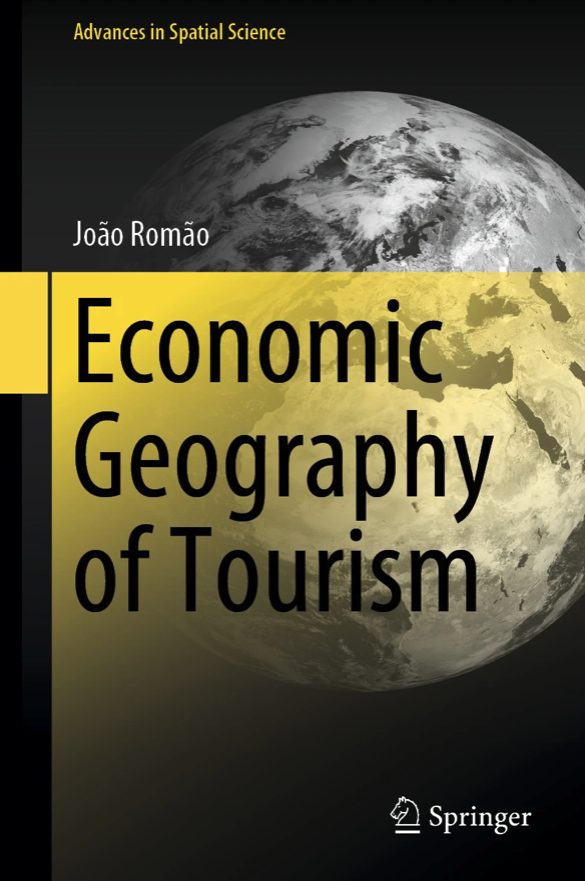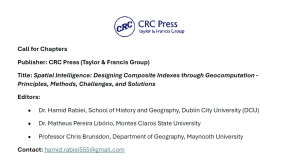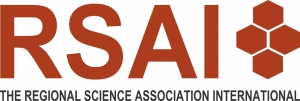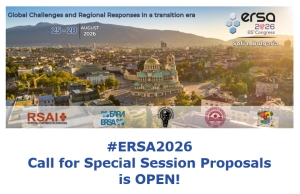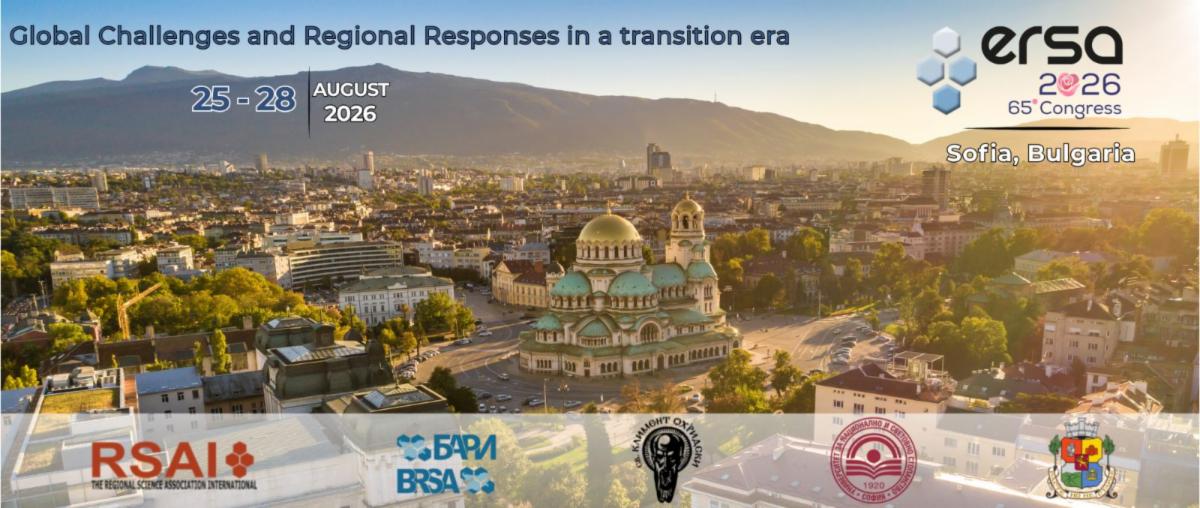Join us
Elisabete Martins
New Councillor at large elected
During the month of October, RSAI members voted for the election of new Councillor at large on the RSAI Council. The following candidate was eventually elected:
|
Prof. Rafael Garduño-Rivera (School of Economics & Business, University of Navarra, Spain) |
Many congratulations to our new colleague! He will start their new term on Jan. 1, 2026.
At the same time, the Council warmly thanks the Councillor at large ending her term (Prof. Daniela Luminita-Constantin (Bucharest University of Economic Studies)) for her service.
ERSA Monthly E-news - October 2025
|
|||||||||||||||||||||||||||||||||||||||||||||||||||||||||||||||||||||||||||||||||||||||||||||||||||||||||||||||||||||||||||||||||||||||||||||||||||||||||||||||||||||||||||||||||||||||||||||||||||||||||||||||||||||||||||||||||||||||||||||||||
|
|||||||||||||||||||||||||||||||||||||||||||||||||||||||||||||||||||||||||||||||||||||||||||||||||||||||||||||||||||||||||||||||||||||||||||||||||||||||||||||||||||||||||||||||||||||||||||||||||||||||||||||||||||||||||||||||||||||||||||||||||
Call for Chapters | Spatial Intelligence: Designing Composite Indexes through Geocomputation - Principles, Methods, Challenges, and Solutions | Publisher: CRC Press (Taylor & Francis Group)
Call for Chapters
Publisher: CRC Press (Taylor & Francis Group)
Title: Spatial Intelligence: Designing Composite Indexes through Geocomputation - Principles, Methods, Challenges, and Solutions
Editors:
- Dr. Hamid Rabiei, School of History and Geography, Dublin City University (DCU)
- Dr. Matheus Pereira Libório, Montes Claros State University
- Professor Chris Brunsdon, Department of Geography, Maynooth University
Contact: This email address is being protected from spambots. You need JavaScript enabled to view it.
About This Book
Spatial composite indexes are crucial for synthesizing complex, multidimensional data into a single, interpretable value, making them indispensable in various fields, including urban planning, environmental management, and public health. In today's data-driven world, geocomputation has become an essential tool for extracting valuable insights from spatial data. This book with CRC Press (Taylor & Francis Group) will explore the core principles, methods, and real-world applications of spatial composite indexes, offering a comprehensive guide to
advanced spatial analysis.
This book is being written to address the significant challenges in designing and applying spatial composite indexes, from data heterogeneity and scale issues to the complexity of integrating multiple variables. The process can be daunting even for experienced geocomputation
practitioners, with obstacles including data availability and quality, variable selection, weighting and aggregation methods, spatial autocorrelation, and modifiable areal unit problems (MAUP).
The book will be written as a structured learning resource with step-by-step guides to principles and methods for constructing spatial composite indexes, enriched with real-world case studies. It will provide detailed explanations of advanced geocomputation tools and techniques,
practical exercises, and examples to solidify understanding while highlighting cutting-edge challenges and delivering actionable solutions.
Call for Chapter Contributions
We invite scholars, researchers, and practitioners to contribute chapters to this comprehensive edited volume. We are seeking original, high-quality contributions that advance the field of spatial composite index design and geocomputation.
Submission Guidelines Chapter Requirements:
- Length: 3,000-5,000 words (including references)
- Format: Academic chapter format with clear structure
- Content: Original research, comprehensive reviews, or innovative methodological approaches
- Case Studies: Real-world applications and examples strongly encouraged
- Technical Content: Include practical examples, code snippets, or methodological frameworks where appropriate
What We're Looking For:
- Theoretical Contributions: Novel frameworks or conceptual advances
- Methodological Innovations: New approaches to spatial composite index design
- Practical Applications: Real-world case studies demonstrating implementation
- Technical Solutions: Software tools, platforms, or computational approaches
- Critical Analysis: Examination of challenges and limitations in current practices
- Future Perspectives: Emerging trends and research directions
Submission Process:
- Abstract Submission: Submit a 500-word abstract outlining your proposed chapter
- Full Chapter: Upon acceptance of abstract, submit complete chapter
- Peer Review: All chapters will undergo rigorous peer review
- Revision: Authors may be asked to revise based on reviewer feedback
Important Dates
- Abstract Submission Deadline: 30 January 2026
- Full Chapter Submission: 30 July 2026
- Review Completion: 30 October 2026
- Final Manuscript Submission: 30 December 2026
- Expected Publication: ~31 July 2027
Target Audience
This book is designed for:
- Graduate students and researchers in geography, urban planning, and environmental studies
- GIS professionals and spatial analysts
- Policymakers and practitioners working with spatial data
- Software developers creating geospatial applications
- Anyone interested in advanced spatial analysis and composite index construction
How to Submit
Please send your abstract and a brief biographical note to:
Dr. Hamid Rabiei
School of History and Geography Dublin City University (DCU)
Email: This email address is being protected from spambots. You need JavaScript enabled to view it. Include in your submission:
- Chapter title and proposed chapter number
- 500-word abstract
- Brief author biography (150 words)
- Institutional affiliation and contact information
- Any relevant previous publications or experience
Questions?
For questions about the book project, chapter requirements, or submission process, please contact the editorial team at: This email address is being protected from spambots. You need JavaScript enabled to view it..
We look forward to receiving your contributions to this important volume on spatial intelligence and composite index design through geocomputation.
See full call: Call_for_Chapters_-_Spatial_Intelligence.pdf
The call for submissions of abstracts and proposals for special sessions for the 2026 RSAI Congress is now OPEN!
|
|
|
|
|
The Department of Economics at the University of Toledo invites applications for a full-time, tenure-track position at the rank of Assistant Professor of Economics
Assistant Professor, Economics
- Job Description:
The Department of Economics at the University of Toledo invites applications for a full-time, tenure-track position at the rank of Assistant Professor of Economics, beginning August 24, 2026. We seek candidates specializing in applied econometrics—with a focus on spatial econometrics and time-series/forecasting—and applied macroeconomics. Applicants should demonstrate strong quantitative skills, an active interest in applied research, and the ability to contribute to the Ph.D. program in Spatially Integrated Social Sciences by teaching courses in spatial econometrics and mentoring doctoral students.
Successful candidates must be able to teach effectively at both the undergraduate and graduate levels and provide evidence of strong teaching ability. Responsibilities include conducting and publishing research, teaching undergraduate and graduate courses, advising and mentoring students, and providing service to the department, college, and university. The ideal candidate will have prior faculty experience either in a temporary or permanent position, although all applicants will receive full consideration.
For questions, please contact Dr. James Bland, This email address is being protected from spambots. You need JavaScript enabled to view it.
Please include a current C.V., recent research paper or publication and current teaching evaluations.
Minimum Qualifications:
Qualified candidates should have a PhD in Economics or a related discipline. Evidence of a strong applied research agenda is required. Applicants must demonstrate a commitment to excellence in teaching and mentoring at both undergraduate and graduate levels, as well as a clear potential for securing external funding.
Preferred Qualifications:
Teaching experience beyond the Principles of Microeconomics or Principles of Macroeconomics.
Prior experience in a faculty position.
Conditions of Employment:
To promote the highest levels of health and well-being, the University of Toledo campuses are tobacco-free. Pre-employment health screening requirements for the University of Toledo Health Science Campus Medical Center will include drug and other required health screenings for the position.
Equal Employment Opportunity Statement:
The University of Toledo is an equal opportunity employer. The University of Toledo does not discriminate in employment, educational programs, or activities on the basis of race, color, religion, sex, age, ancestry, national origin, sexual orientation, gender identity and expression, military or veteran status, disability, familial status, or political affiliation.
The University is dedicated to attracting and retaining the best and brightest talent and fostering a culture of respect.
The University of Toledo provides reasonable accommodation to individuals with disabilities. If you require accommodation to complete this application, or for testing or interviewing, please contact HR Compliance at This email address is being protected from spambots. You need JavaScript enabled to view it. or 419-530-4747 between the hours of 8:30 a.m. and 5 p.m. or apply online for an accommodation request.
Computer access is available at most public libraries and at the Office of Human Resources located in the Center for Administrative Support on the UToledo Main Campus.- + info at: https://jobs.chronicle.com/job/37900887/assistant-professor-economics/
Call for candidatures for new RSAI president | Extended deadline: October 31st, 2025
Dear Members of the Regional Science Association International,
according to the RSAI Constitution, each first year of term of the RSAI President, the Association faces the pleasant task of electing the Incoming President, who will in 2026 take on the position of President Elect, and work along with Prof. Hiroyuki Shibusawsa, current RSAI President, to gradually move on to the position of President in 2027. Here is an excerpt of the rules of the Association for managing this important step:
Nomination committee. The RSAI Council has appointed a dedicated nomination committee, that following the rule of the RSAI Constitution is made up of the RSAI President (Hiroyuki Shibusawsa), the RSAI Immediate Past-President (Hans Westlund), four members of the RSAI Council (one each from among the council members who are appointees of the four superregional organizations: Roberta Capello for ERSA, In Kwon Park for PRSCO, Andre Chagas for LARSA; Sarah Low for NARSC), and two members of the Long Range Planning Committee (LRPC) recommended by the LRPC itself (Eduardo Haddad and Budy Resosurdamo).
Criteria of the nominees. The nominees should satisfy the following criteria: a) financial resources sufficient to cover travel costs to perform RSAI duties; b) support from candidate’s institution including relaxation of duties to enable President to travel as needed to execute RSAI business; c) RSAI Council experience (Council member experience) and/or other service to the regional science community (e.g., supra-regional and/or other sections, editor or one of the regional science journals, etc.).
Election procedure. The President Elect nomination committee shall [...] make a recommendation to Council at a Council meeting of this same year. Upon receiving this recommendation, the Council will select a nominee. The President‐Elect and Vice‐President shall start his/her appointment at the start of the next calendar year (i.e. the second year of the current President’s term).
RSAI members from the NARSC area who want to be nominated as candidate for the President of the Regional Science Association International should send to This email address is being protected from spambots. You need JavaScript enabled to view it. (cc-ing the RSAI ED at This email address is being protected from spambots. You need JavaScript enabled to view it.) within October 31st, 2025 the following material:
- A two-page CV and a Picture;
- A two-page statement on the motives in support of the candidacy and on the future strategy for the RSAI.
The Nomination Committee will then nominate the candidates to be voted on-line by the Members of the Council. Results will be diffused through in RSAI webpage.
Thank you in advance for participating in this crucial stage of the Association's life,
Kind regards,
Portuguese Review of Regional Studies (RPER): Nº 72 (2025) is already available!
No. 72 (2025): Portuguese Review of Regional Studies
Full Issue
Technical Information
Articles
The New Issue of Regional Statistics is already Available! (2025, VOL 15, No 4)
REGIONAL STATISTICS, 2025, VOL 15, No 5.
STUDIES
Dear Readers,
We are pleased to say that the 5/2025 issue of Regional Statistics has been published and available online!
CONTENT
Fernando Antonio Ignacio González: Immigration and native labour market conditions in Argentina
https://www.ksh.hu/statszemle_archive/regstat/2025/2025_05/rs150501.pdf
Sulaeman – Husnul Mirzal – Muhammad Sultan Mubarok – Indar Fauziah Ulfah – Akhmad Fauzi Nurulhamzah – Moh Agus Nugroho – Sulistya Rusgianto: Enhancing food security through agricultural financing and loans within Indonesia’s dual banking system: empirical study approaches
https://www.ksh.hu/statszemle_archive/regstat/2025/2025_05/rs150502.pdf
Nándor Zagyi – Róbert Kuszinger – Ábel Bagdy – Zoltán Wilhelm: Spatial characteristics of the sex ratio shift in India
https://www.ksh.hu/statszemle_archive/regstat/2025/2025_05/rs150503.pdf
Éva Berde – Izabella Kuncz – Petra Németh – Sándor Remsei – Eszter Szabó-Bakos: GDP per capita and human capital investment in five countries after exhaustion of the first demographic dividend
https://www.ksh.hu/statszemle_archive/regstat/2025/2025_05/rs150504.pdf
Róbert Tésits – Martin Rongics: Regional opportunities for community-led local development in the area of a Hungarian Leader Association, 2014–2020
https://www.ksh.hu/statszemle_archive/regstat/2025/2025_05/rs150505.pdf
Roberto Yoan Castillo Dieguez – Samuel Arturo Mongrut Montalván – José Antonio Climent Hernández – Ma. Benilde Rincón García – Graciela Lara Gómez: Regional inequality in Mexico’s post-pandemic economic recovery
https://www.ksh.hu/statszemle_archive/regstat/2025/2025_05/rs150506.pdf
László Szívós – Jenő Fáró: How did specific aspects of national culture, uncertainty avoidance, and long-term orientation moderate the effect of Covid-19 on earnings management?
https://www.ksh.hu/statszemle_archive/regstat/2025/2025_05/rs150507.pdf
Hana Boháčová – Pavla Jindrová: Sectoral structure of employment in EU member states with an emphasis on the quaternary sector or on the GDP, 2011–2023
https://www.ksh.hu/statszemle_archive/regstat/2025/2025_05/rs150508.pdf
Join us to our social networking sites:
Call for Papers | RSPP Special Issue: The future of Cohesion

Call for Papers for Special Issue in Regional Science Policy & Practice (RSPP)
Title: "The future of Cohesion"
1. Aim of the special issue
The Special Issue will take inspiration from the experience stemming from the reflections and policy recommendations by the High-Level Group discussed in their report on the Future of Cohesion, situated within the broader debate about the EU's post-2027 budget. These deliberations are already underway and, crucially, the European Commission is now proposing what may be the most profound transformation of European policies in over half a century.
At the heart of this transformation lies a thorough rethinking of Cohesion Policy itself. This could push the EU into uncharted territory: What does a stronger focus on competitiveness mean for regional balance? Can cohesion still serve as the glue that binds diverse regions and peoples together? The Special Issue aims to provide a timely and critical reflection on these questions, offering informed perspectives that can influence both the current discourse and policy direction.
2. Length of contributions
The editors are aiming for papers with a maximum length of 8,000 words, including references.
3. Review process
As with all academic submissions to the journal, the process will involve peer review. Each paper will be sent to at least two anonymous reviewers. If the reviews are favorable, authors will be asked to make revisions in line with the feedback before final acceptance.
This ensures that the Special Issue maintains high scholarly standards and remains impactful both within and beyond academia.
4. Open access and fees
Regional Science Policy & Practice is a gold open access journal. This guarantees free access for all readers but does involve a publication fee, typically covered by academic institutions.
5. Deadlines
The submission portal (https://www.editorialmanager.com/rspp) will accept submissions to this special issue from Oct. 20, 2025 until Jan. 31, 2026. When submititng your paper to the special issue, please prepare a submission letter clearly stating that your work is meant to be evaluated for this collection. Should a cover letter be missing, the submission will be treated as a regular one.
6. Editors of the Special Issue
The Special Issue will edited by Prof. Andrés Rodríguez-Pose, Chair of the Group of high-level specialists on the future of Cohesion Policy. Prof. Rodríguez-Pose is the Princesa de Asturias Chair and a Professor of Economic Geography at the London School of Economics. He is the Director of the Cañada Blanch Centre LSE and was Head of the Department of Geography and Environment between 2006 and 2009.
He has been President of the Regional Science Association International (RSAI) (2015-2017) and served as its Vice-President in 2014. He was also Vice-President (2012-2013) and Secretary (2001-2005) of the European Regional Science Association.
He is a part-time Professor of Innovation at the Centre for Innovation Research, University of Stavanger (Norway). He has been visiting professor at several higher education institutions, including the College of Europe (Belgium), the University of Cambridge (UK), the University of Hannover (Germany), the University of Split (Croatia), and the Autonomous University of Madrid (Spain).
He has a long track record of research in regional growth and inequality, fiscal and political decentralization, institutions, discontent and populism, innovation, migration, and development policies and strategies. This research is widely cited in academic circles. In the 2021 Stanford/Elsevier list of the 2% most cited scientists (which identifies close to 200,000 researchers across all areas of science), he was among the 0.1% of researchers across all academic disciplines. He was ranked first worldwide in the field of urban and regional planning by scholarly citations in 2020. He also appears on Clarivate's Web of Science 2020 and 2021 lists of Highly Cited Researchers.
Prof. Rodríguez-Pose will be joined as internal editor by the Editor in Chief of Regional Science, Policy & Practice, Prof. Andrea Caragliu. Andrea Caragliu is Associate Professor of Regional and Urban Economics at Politecnico di Milano since 2018. He holds a Ph.D. in Spatial Economics, VU University Amsterdam, 2015, and a Ph.D. in Management, Economics and Industrial Engineering, Politecnico di Milano, 2010. The dissertation has been awarded the Merit Prize of the EU Committee of the Regions Prize for the Best Doctoral Dissertation and Diploma d’Onore AISRe for the best doctoral dissertation in Regional Science “Giorgio Leonardi” 2010.
Between 2019 and 2024 he acted as Executive Director of the Regional Science Association International, for which he previously edited the Newsletter. Besides acting as Editor in Chief of Regional Science, Policy & practice, he is also Associate Editor for Plos ONE. Since 2025, he coordinates the Ph.D. program in Architecture, Built Environment, and Constriction Engineering at Politecnico di Milano.
#ERSA2026 Call for Special Session Proposals is OPEN
|
About Us
The Regional Science Association International (RSAI), founded in 1954, is an international community of scholars interested in the regional impacts of national or global processes of economic and social change.

